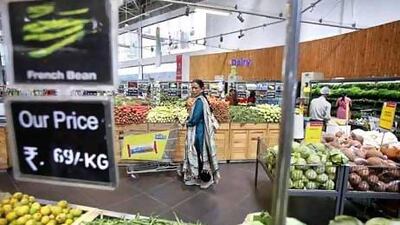MUMBAI // Imran Khan, a garlic seller in Mumbai, is feeling the pinch of higher food prices in India.
Some of the vegetables he buys to feed his family have doubled in price in the past year.
"For 100 rupees [Dh6.79] you can only buy two or three vegetables now," Mr Khan said.
"It's too expensive. We don't earn the salary to pay this much," adds the stallkeeper, who has two young sons of four and two.
Food prices in India have rocketed, partly because of deficient monsoon rains, boosting annual consumer price inflation in India to 10.03 per cent last month compared with 9.86 per cent in July, official data released yesterday showed.
Food prices overall were up 12.03 per cent compared with a year ago, according to the data. There was a 20.79 per cent increase in vegetable prices, while pulses increased by 16.04 per cent. The fuel inflation rate was 7.55 per cent, while clothing inflation was 10.71 per cent.
Jayesh EK, who runs the A to Z Vegetables stall in Colaba Market in Mumbai said he had no choice but to pass higher costs on to his customers. He said prices at his stall eased from very high levels in the past couple of weeks because of better harvests but that now they were set to rise again following the recent fuel price hike.
"Fuel prices are going up, transport [cost] is very high," he said. "We must increase the prices or we can't get the profit from the product."
Wholesale price inflation data released last week in India showed an increase to 7.55 per cent last month, which was higher than expected. This compared with a 32-month low of 6.87 per cent in July.
The Reserve Bank of India on Monday kept interest rates on hold at high levels, despite pressure from industry for a cut, as it asserted inflation remained its major concern.
"Inflation risks are still lingering," said Leif Eskesen, HSBC's chief economist for India and ASEAN. "The monsoons remain deficient despite more rain in recent weeks and food inflation is expected to rise as a consequence. The adjustment in fuel prices will also add to inflation and possibly lift inflation expectation."
The Indian government last week reduced diesel subsidies, hiking prices by 5 rupees a litre. This is expected to feed into higher inflation in the short-term, with a knock-on effect on transport and food prices. In the longer term, it is likely to help cool inflation as it helps reduce the fiscal deficit.
"The immediate direct impact of a revision in diesel prices on fuel inflation is estimated to be 60 basis points," according to analysis by Crisil, an Indian ratings and research firm.
"The revision in electricity prices earlier this year will also continue to create an upward pressure of around 35 basis points in September," it said.
"However, these pressures are short-term in nature and are expected to have limited second-round impact on wholesale price index inflation.
"The government's resolve to implement reforms and reduce its fiscal deficit at a time of high global liquidity will help attract capital inflows," Crisil said.
"This will lift some pressure off the rupee and lower the imported component of inflation."
The government on Friday announced a spate of major economic reforms including opening up the retail and aviation sectors to more foreign investment.
twitter: Follow and share our breaking business news. Follow us
iPad users can read the digital edition of business section as it was printed via our e-reader app. Click here

